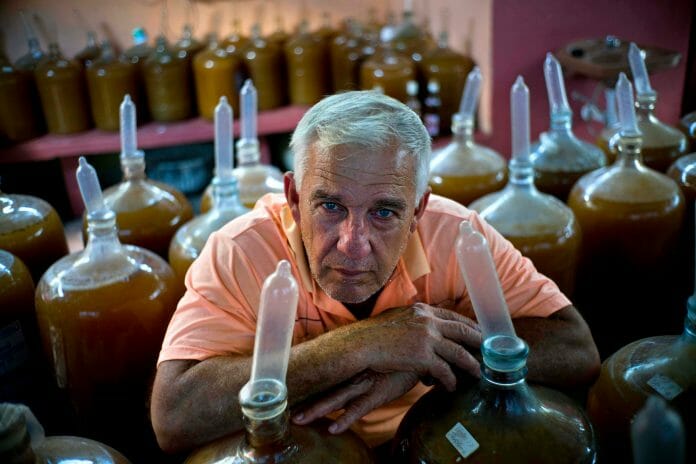Every day at sunset, Ernesto Rodriguez heads to the Malecon esplanade in the Cuban capital, Havana, where locals and tourists gather to party with rum, cigars and music by the ocean.
In his pocket, he has four condoms. But Rodriguez is not planning to get lucky tonight – at least, not in that sense. He is a fisherman, and uses the condoms to make a float to carry his fishing line.
He takes a seat on the stone wall of the Malecon, takes a deep breath, brings one to his lips and blows. He repeats this four times, then ties the condoms together, making sure one of them stays upright to act as a sail.
Rodriguez casts the line out to sea, sending out the bait to lure fish swimming in the waters of Havana’s iconic seafront.
The makeshift float carries his line beyond casting distance and keeps the bait high in the water, strengthening the line against the pull of a tuna fish or red snapper.
“Big fish don’t come close to the seawall – only small ones do – so you have to go and look for them,” he says.
Rodriguez fishes as a hobby, but also sells some of his catch to private restaurants. Officially, he is not allowed to sell it, but the restaurants known as “paladares” pay up to a dollar per kilogram for fish such as snappers, whose fine-textured meat is popular with clients.
“People used to fish with cardboard boxes, but they deteriorated quickly in the water, while the latex that condoms are made of is stronger,” says another fisherman, Alberto Salazar, while waiting for fish to bite.
Condoms can take the line more than 300 metres out to sea, a distance that could otherwise only be achieved by boat.
After many Cubans died while trying to reach the United States on flimsy vessels in the 1990s, the use of inflatable boats was banned on the Malecon, and fishermen do not venture out to the sea for fear of fines.
They prefer to fish with condoms, which allow them to catch fish weighing up to 15 kilograms.
In an attempt to prevent unwanted pregnancies and the spread of sexually transmitted diseases, the Cuban government subsidizes the price of condoms, with a three-condom pack costing only about one peso (five cents).
Cuba imports 120 million condoms annually from China and India.
And frequent shortages of basic goods have prompted Cubans to come up with plenty of creative uses for them – not only for fishing, but also other purposes, such as repairing punctured tyres and even making wine.
Orestes Estevez, a former Interior Ministry official, obtained a wine-making licence under reforms to open up the economy launched by former president Raul Castro.
His winery could not function without condoms, which Estevez uses to gauge when the wine fermentation is finished.
A condom is placed at the mouth of the fermenting bottle where 12-per-cent wine will ferment for up to 45 days. Two tiny holes are punched into it to prevent it from blowing up as gases are released.
“During the fermentation process, the condom moves and starts to rise until it is erect, like in a man,” the winemaker explains.
When the condom collapses, the wine is ready to be taken out and clarified.
In his small shop, La Casa del Vino, Estevez sells about 20 bottles of wine a day for prices ranging from 50 cents to a dollar.
“Alcoholics Anonymous has congratulated me, because people who used to drink bad booze now drink good wine,” he says with pride.









